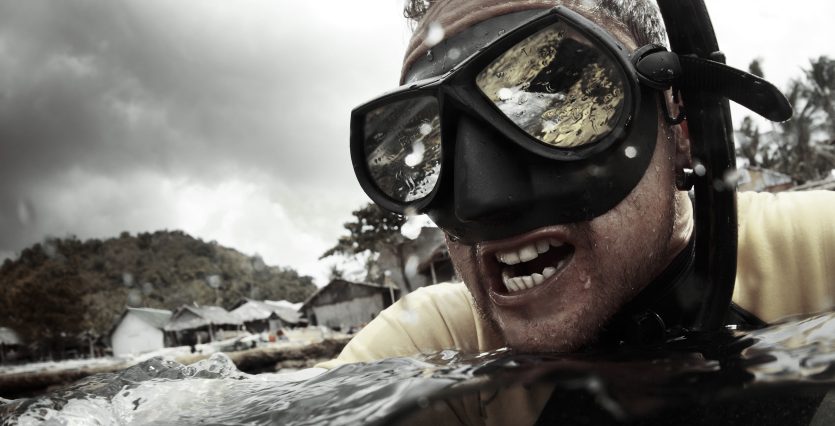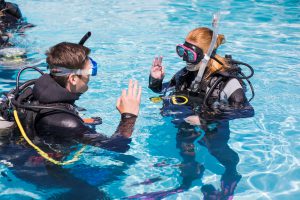A while ago, I was teaching a confined water session and it wasn’t going well. It was apparent to me the student was making a sincere effort to learn the skills and I believe it was obvious I was doing my best to be helpful. Nevertheless, we were struggling. It was one of those sessions that can deteriorate quickly. Fortunately, we were patient with each other and eventually we got through the skills. Afterward, thinking about the experience I realized that sometimes being PEEVED can be a positive thing. Below is my take on being “Positively Peeved.”
Patience: Patience is certainly an important quality in a teacher and an invaluable tool when teaching. The question is what does “being patient” mean? Unfortunately, since we typically don’t have unlimited time, it doesn’t mean we will be infinitely patient and provide the student with an infinite amount of time and attempts to master the skills and knowledge. To me, patience means recognizing the student’s effort and, when the effort fails to produce the desired result, not getting frustrated, or at least not letting my frustration show. It also means making sure my student knows that even if, due to time or other constraints, we have reached a point where we must move on, I have not given up and hopefully neither has my student.
Energy: Sometimes having energy isn’t enough in and of itself. Students pick up on the energy we project so we must always be aware of how we appear to the students. Once when I was coaching a sailing team, I was extremely focused on some skill observations. I was processing my thoughts internally and so was very quiet throughout practice. This was unusual for me and at the end of the session I realized the entire team thought I was either angry or disappointed, even though it had been a good practice.
We must make sure we are projecting the energy and presence we want our students to receive.
On those days when my energy isn’t what I would like it to be, I remind myself that “while sometimes teaching scuba feels like it is just a job, it is a pretty good job.”
Enthusiasm: I am not saying we must be cheerleaders. We all have different personalities and will express our enthusiasm differently. I believe it is vital our students feel that we are as enthusiastic about teaching them as they are about learning from and training with us. I also believe that encouragement should be sincere and infinite, while praise must be earned.
Voice: When they are being diplomatic my friends tell me I have a voice that carries. One friend with a military background commented “Frank, you just don’t have a tactical voice.” Those who are diplomatic simply describe my voice as loud. Sometimes, such as in the ocean or the pool, volume can be an advantage. At other times it can have a negative effect. I have had students who equate volume with anger. Others have thought that I must think they don’t understand and that is why I am loud. This is something I will continue to work on. In the meantime, I explain to my students that for me volume typically means I am alive and enthusiastic, and not angry or upset.
 Expression: Be aware of your expression. When I am thinking hard, my wife says I look like a cop about to write a ticket. Other people have asked me if I am in pain. Either way, this is not an expression the students want to see when they look at the instructor. Unfortunately, despite my best efforts, I have been unable to develop a more scholarly expression as I puzzle through things. I will continue to work on this but in the meantime, I warn my students up front, letting them know about my “expression defect” and promising that if something is bothering me I will let them know.
Expression: Be aware of your expression. When I am thinking hard, my wife says I look like a cop about to write a ticket. Other people have asked me if I am in pain. Either way, this is not an expression the students want to see when they look at the instructor. Unfortunately, despite my best efforts, I have been unable to develop a more scholarly expression as I puzzle through things. I will continue to work on this but in the meantime, I warn my students up front, letting them know about my “expression defect” and promising that if something is bothering me I will let them know.
Demeanor: When evaluating our students, I think most of us try to consider the entire person. Whether consciously or unconsciously we note: What they say, how they say it when they say it, their expression, and their overall bearing and posture. Then we ask ourselves if their behavior is consistent with what we hear them say and their expression as they say it. Naturally, our students evaluate us in the same way. If we say one thing but behave as if we believe something else our students will pick up on that and we will lose the trust necessary for effective teaching to take place. In my experience, the easiest way to be consistent in your demeanor is to be honest with yourself and your students. That way you don’t have to worry about keeping up a false persona.
I do not have an infinite supply of patience and understanding and so at times, I have been frustrated, impatient, peeved, or even just plain angry with students. As human beings, we are all susceptible to those feelings. After an episode in which I have experienced any of those emotions, I ask myself if my reaction was understandable or justified. As you probably expect, sometimes the answer is yes, and sometimes it is no. Ultimately, I have developed the following personal philosophy: Justified anger is justified. Losing your temper is losing. If I am not sure which applies to the situation at hand, I have probably just lost.
Next time you start to feel a little bit peeved, whether in class or some other situation, hopefully, you will recognize it and make the experience as positive as possible for everyone involved. Frank Degnan NAUI # 7165 can be reached at degnan@degnandivers.com



